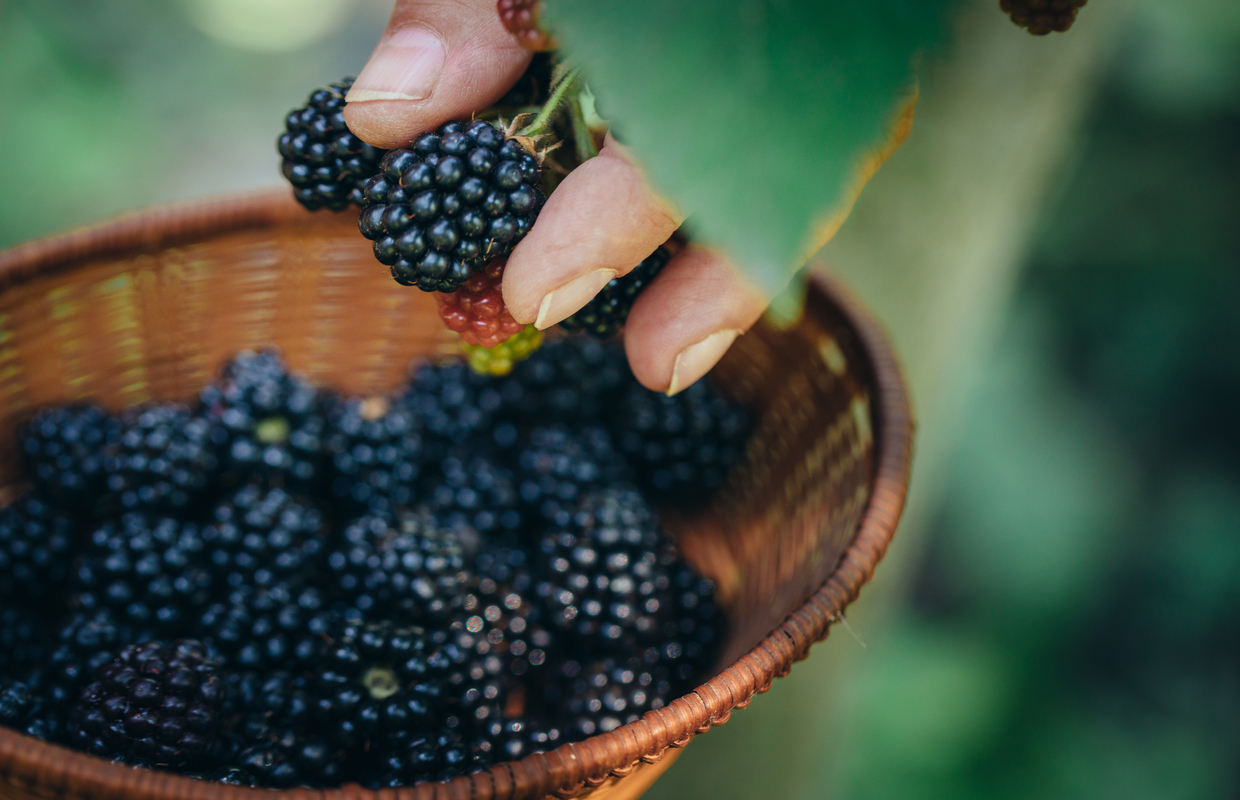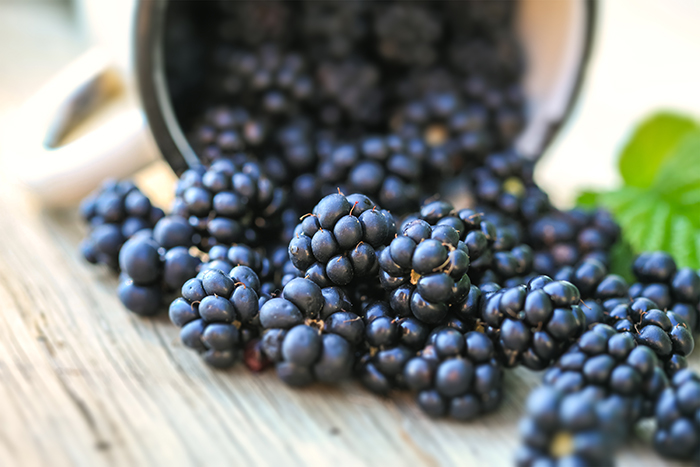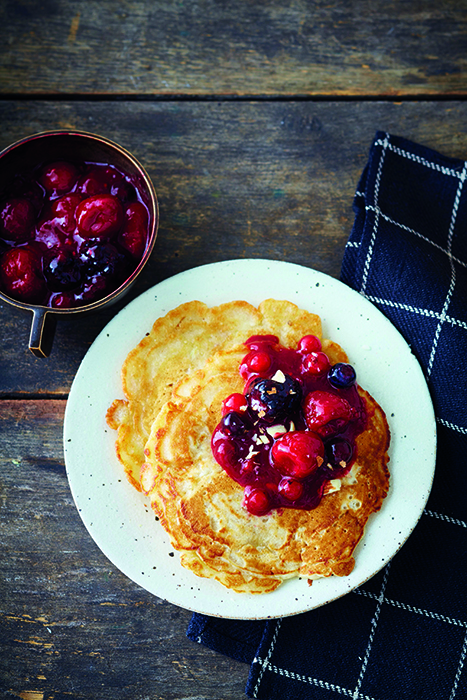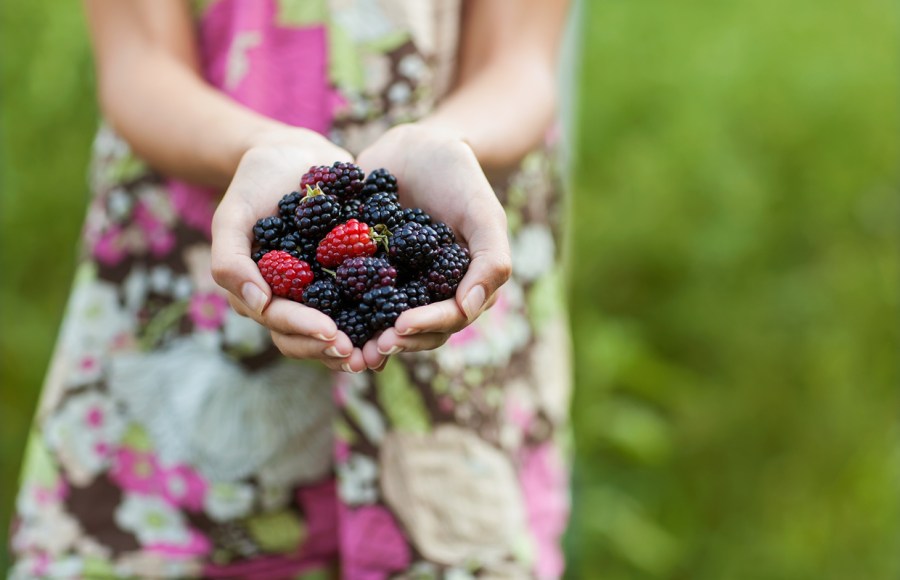Blackberry picking season is upon us! Here, Burleigh Pottery takes a look at the health benefits of blackberries and offers tips to help you forage for this delicious berry in the wild…
Blackberry picking is a great activity to do with the whole family. The best part? You can take them home and cook up some tasty culinary creations that may have some great health benefits too!
These plump, juicy berries can be found in the wild hiding among prickly brambles, and their taste is often compared to a grape, however some have a tarter flavour. Despite their reputation as an autumn berry, they are ready to pick from the start of August and throughout September.

5 health benefits of blackberries
Blackberries don’t just taste great, but they can also help take care of your body. These fruits contain a wide variety of nutrients that keep you in good health.
1. Blackberries are full of vitamin C
Blackberries may be small, but they’re packed full of vitamins, especially vitamin C. This is important for keeping your cells, skin, blood vessels, bones, and cartilage healthy, and can help your body heal itself faster (NHS). Luckily, just 80g of blackberries contains 12mg of vitamin C (Love Fresh Berries).
According to the NHS, adults need 40mg of vitamin C each day, so eating these little fruits can help you achieve your recommended daily intake much more quickly.
2. Blackberries are high in manganese
Perhaps more surprisingly, is that blackberries contain over half the recommended daily dose of manganese, which can help your body activate enzymes responsible for vital processes, such as controlling your metabolism (NHS). Manganese can also be good for bone development and nutrient absorption.
3. Blackberries are a source of fibre
While whole grains are the best source of fibre, berries can also help keep your digestive system in check. 80g of blackberries contains 2.5g of fibre. As a comparison, 80g of wholemeal bread contains around 6g. The UK government recommends that most adults get at least 30g of fibre each day, while children need between 15–25g (NHS). So, adding a handful of blackberries to your morning smoothie or sprinkling a handful into your dessert can help you and your family reach your recommended daily intake.
4. Blackberries have antioxidant health benefits
Not only are blackberries full of vitamins, but they’re also high in antioxidants. These are important for protecting your cells against free radical damage and may help prevent heart disease and cancer. A study published in the Journal of Agricultural and Food Chemistry found that blackberry phenols, a type of antioxidant, showed signs of protecting against oxidative stress and inflammation.
5. Blackberries can aid brain function
The antioxidants in blackberries don’t just help keep your cells healthy, but they may even keep your brain in good condition too. A research review published in the Journal of Agricultural and Food Chemistry concluded that the antioxidant effects of berries could help reduce brain inflammation and prevent age-related cognitive and motor issues. Having just a few blackberries each day could help give your brain a little boost and may improve your memory.

Top tips when foragaging for blackberries
Where to find blackberries:
Blackberries themselves are easy to spot with their round, bobbled texture, and purple hue. Finding wild bramble bushes takes a little more patience.
The first places to check are country lanes and walkways. As brambles are essentially a weed, they sprout up in unkempt places. Woodland areas and public footpaths through farmland are also regular spots for the berries to grow.
Perhaps the best part about blackberry foraging is that the fruits can be eaten while you pick — something that may convince children to tag along — but make sure to take gloves or be cautious while picking as the leaves can be sharp. It’s also important that you rinse your berries before eating them, so make sure you take a water bottle with you on your foraging trip.
How to prepare freshly picked blackberries:
On returning home from foraging, you can store the berries in an uncovered container in a cool, dry place. This should keep them fresh for around two days. Small berries that have a squashier texture should be used straight away as they rot quicker than those that are firm.
Immediately before use, place the berries into a bowl and pour cold water over them. Adding a teaspoon of salt is also a clever trick to kill any small bugs that may be hiding among the fruit.
After allowing them to soak for around two hours you can begin to pick away the leaves and left-over bramble spikes before eating them whole or adding them to your favourite dishes.

Blackberry recipe ideas:
According to Kate Cartwright from Burleigh Pottery: ‘Blackberries can add a delicious bite to any recipe. While their flavour is sweet, tart undertones mean these fruits pair wonderfully with savoury ingredients such as cheese and nuts.
‘Due to their flavour and many health benefits, blackberries are also perfect for sweetening desserts and drinks naturally. Blend them into your favourite smoothies and sorbets or sprinkle them over your porridge or pancakes for a hit of sweetness, all while using less refined sugars. Another creative option is to mix them into some plain yoghurt and mashed banana, then freeze to make a delicious healthy ice cream the whole family will love.
‘The UK is full of blackberry bushes, meaning a slow walk along a country lane should have plenty of fruit to forage. Keep an eye out for the bobbly globe-shaped berry and its prickly bramble habitat.
‘Although picking berries is an effective way of adding sustainability to your lifestyle, being responsible should be a priority when foraging. Only take what you need and be mindful of other plants and animals living among the greenery.’







